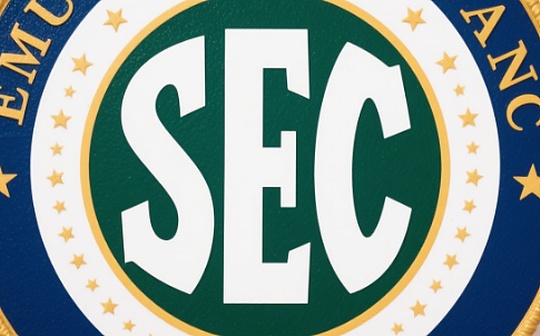
Source: US SEC Chairman Paul S. Atkins, keynote speech at the Cryptocurrency Working Group Tokenization Roundtable; Translated by: AIMan@Bitchain Vision
I am very happy to speak to all the outstanding guests at today’s Tokenization Roundtable.
The topic discussed this afternoon is very timely becauseSecurities are increasingly migrating from traditional (or “off-chain”) databases to distributed ledger systems based on blockchain (or “on-chain”).
The transition from off-chain systems to on-chain systems is similar to the transition from analog vinyl records to tapes to digital software decades ago.The ability to easily encode audio into digital file formats and is easy to transfer, modify and store has brought great innovation to the music industry.Audio is free from the constraints of static, fixed format creation.It suddenly becomes compatible and interoperable between various devices and applications.It can be combined, split and programmed to form a completely new product.This has also promoted the development of new hardware devices and streaming content business models, greatly benefiting consumers and the US economy.
Just as the transformation of digital audio has completely changed the music industry,The migration to on-chain securities has the potential to reshape all aspects of the securities market because it can bring about new ways of issuing, trading, holding and using securities.For example, on-chain securities can use smart contracts to distribute dividends to shareholders transparently on a regular basis.Tokenization can also promote capital formation by converting relatively lack of liquidity assets into liquid investment opportunities.Blockchain technology is expected to bring a wide range of new use cases to securities, giving birth to many traditional rules and regulations of the committee, such as new types of market activities that have not yet been considered.
To make the United States the “Earth Crypto Capital” envisioned by President Trump, the SEC must keep up with innovation and consider whether regulatory reforms are needed to accommodate on-chain securities and other crypto assets.Rules and regulations designed for off-chain securities may be incompatible or unnecessary with on-chain assets and will inhibit the development of blockchain technology.
An important task during my tenure as the chairman of the US SEC was to develop a reasonable regulatory framework for the crypto asset market, establish clear rules for the issuance, custody and transaction of crypto assets, and to continuously prevent bad actors from breaking the law.Clear rules are essential to protecting investors from fraud, especially to help them identify those illegal scams.
The US SEC ushered in a new day.Policy development will no longer be based on temporary law enforcement actions.Instead, the U.S. SEC will use its existing rule-making, interpretation and immunity to set practical standards for market participants.The US SEC’s approach to enforcement will return to Congress’s original intention of regulating violations of these defined obligations, especially in terms of fraud and manipulation.
This work requires coordination from multiple offices and departments within the Securities Commission, so I am very happy to see the Uyeda Commissioner and Peirce working together to form the cryptocurrency task force.The Securities Commission has long been plagued by policymaking.The Cryptocurrency Task Force reflects how our various policy departments work together to quickly provide the US public with the clarity and certainty they need in the long run.
Now, I focus on three key areas of crypto asset policy – issuance, custody and trading.
issued
First, I hope the Securities Commission has set clear and reasonable guidelines for the issuance of crypto assets that are part of securities or are subject to investment contracts.Currently, only four crypto asset issuing institutions have conducted registered issuances and issued under Ordinance A.Issuers largely avoid such issuances, partly because they are difficult to meet relevant disclosure requirements.If the issuer does not intend to issue ordinary securities, such as stocks, bonds or notes, it will also be difficult for the issuer to determine whether crypto assets constitute “securities” or are bound by investment contracts.
Over the past few years, the US SEC initially took what I call the “ostrich mentality”—perhaps the hope that cryptocurrencies will fade away.It then changed its direction and adopted the law enforcement and supervision strategy of “fire first and ask questions”.The US SEC claims to be willing to communicate with potential registrants, “just come and visit directly,” but it turns out that this statement is short-lived at best and often misleading because the US SEC does not make the necessary adjustments to the registration form for this new technology.For example, Form S-1 still requires detailed information on executive compensation and benefits usage that may not be important for investment decisions in crypto assets.Although the U.S. SEC has previously adjusted its forms for asset-backed securities issuance and the issuance of real estate investment trusts, despite the growing interest in crypto assets in the past few years, the U.S. SEC has not adjusted its crypto assets.We cannot encourage innovation through the “square and round chisel” method.
I am committed to pushing the Securities Commission to develop new guidelines.Securities Commission staff recently issued a statement regarding certain registration and issuance disclosure obligations.The staff also clarified that certain issuances and crypto assets do not involve federal securities laws and I hope that the staff will continue to follow my instructions to clarify other types of issuances and assets.However, existing registration exemptions and safe harbors may not be entirely suitable for certain types of crypto asset issuances.I think these statements from staff are only temporary—the SEC actions are crucial and necessary.At the same time, I have asked the U.S. Securities Commission staff to consider whether additional guidance, registration exemptions and safe harbor are needed to open up avenues for issuing crypto assets within the U.S.I think the Securities Commission has broad discretion to adapt to the crypto industry under the securities laws, and I intend to do that.
Hosting
Second, I support providing registrants with more autonomy to decide how to host crypto assets.US SEC staff recently revoked Employee Accounting Notice No. 121, removing a major hurdle for companies seeking to provide crypto-asset custody services.This statement is a serious mistake.Staff are not authorized to take such extensive action beyond the Securities Commission’s actions without notice and comment rules.The action caused unnecessary confusion, and its impact was far beyond the jurisdiction of the US SEC.However, the U.S. SEC can do much more than repeal SAB 121 to enhance competition in the legal and compliant custodial services market.
It is necessary to identify which types of trustees meet the “qualified trustee” qualifications stipulated in the Advisory Law and the Investment Company Law, and to clarify reasonable exceptions to the qualified trustee requirements to adapt to certain common practices in the crypto asset market.Many advisors and funds can use self-custodial solutions that employ more advanced technologies to protect crypto assets than some custodians on the market.Therefore, custody rules may need to be updated to allow advisors and funds to self-custody in certain cases.
In addition, it may be necessary to abolish the “special purpose brokerage dealer” framework and replace it with a more reasonable system.There are currently only two special purpose brokerage dealers operating, which is clearly due to the imposition of significant restrictions on these entities.Brokerage dealers have never been restricted to serve as custodians of non-securities crypto assets or crypto asset securities, but the Securities Commission may need to take action to clarify the application of customer protection and net capital rules to such activities.
trade
Third, I support allowing registrants to trade more types of products on their platforms and respond to market demand to carry out activities previously banned by the Securities Commission.For example, some brokerage dealers are trying to enter the market through the “super app”, which provides integrated trading of securities, non-securities and other financial services.Federal Securities Act does not prohibit registered broker dealers with alternative trading systems from facilitating non-securities trading, including through “paired transactions” between securities and non-securities.I have asked the Securities Commission staff to assist us in designing a modern approach to ATS regulatory regime to better adapt to crypto assets.In addition, I asked the U.S. Securities Commission staff to discuss whether further guidance or rulemaking is needed to facilitate listing and trading of crypto assets on the national stock exchange.
While the Securities Commission and its staff are committed to developing a comprehensive framework for crypto-asset regulation, securities market participants should not be forced to go overseas for blockchain technology innovation.I would like to explore whether a conditional exemption is appropriate for registrants and non-registers seeking to bring new products and services to the market if these products and services may be incompatible with the current committee rules and regulations.
I am eager to coordinate with colleagues in President Trump’s administration and Congress to make the United States the best place to participate in the crypto asset market in the world.








